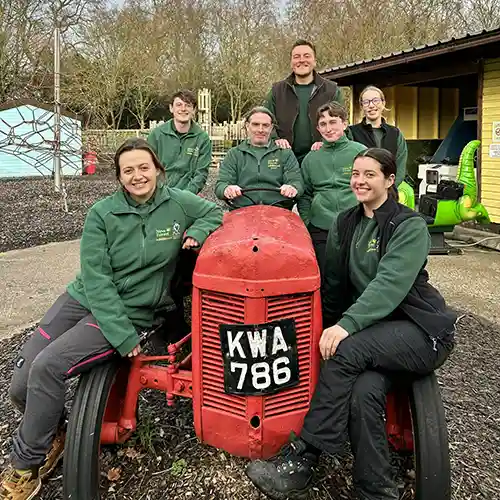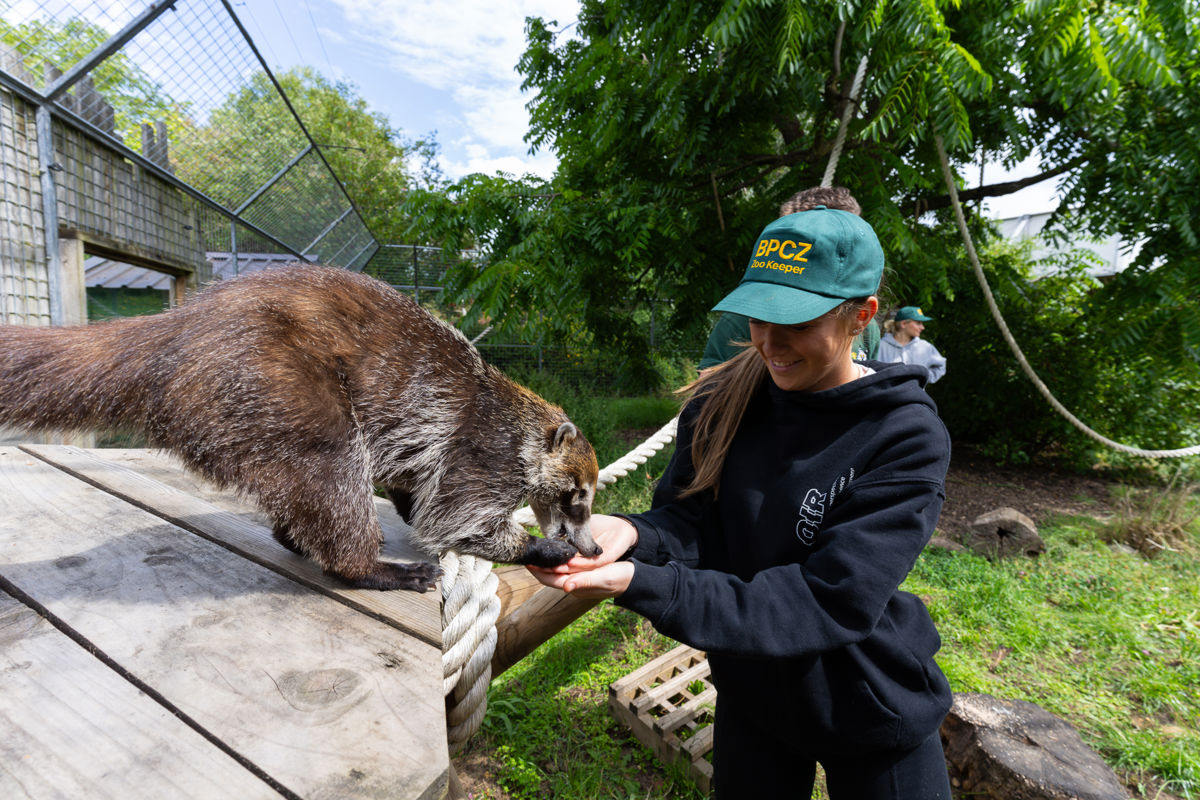
ملخص
-
تاريخ التأسيس 19 مايو، 1911
-
المجالات الوظيفية وظائف القطاع العسكري
-
الوظائف المنشورة 0
-
شاهد 62
وصف الشركة
How To Become A Zoo Keeper?
“The greatness of a nation and its moral development can be evaluated by the way its animals are treated.” – Mahatma Gandhi
Do you love animals and imagine operating in a zoo? Zoo keepers are type in safeguarding wildlife and taking care of animals. At places like the Zoological Society of London (ZSL), over 20,000 animals get the care they need from specialists.
To become a zoo keeper, you need hard work, education, and a love for animals. This task is exciting, letting you deal with numerous types and help with essential preservation work. If you’re into wildlife or animal welfare, zookeeping might be best for you.
Starting your zoo keeper profession suggests discovering what’s needed. This guide will cover education, experience, zookeeper and more. It’s all you require to know to start a fulfilling zookeeping profession.
Understanding the Role of a Zookeeper
Exploring what a zookeeper does reveals a role filled with obstacles and rewards. They concentrate on animal welfare and conservation. Zookeepers work hard to keep animals healthy and happy in their care.
Daily Responsibilities and Tasks
A zookeeper‘s day is filled with essential jobs:
- Preparing meals that meet each animal’s nutritional needs
- Cleaning up enclosures to keep them tidy and safe
- Supervising animal health and behaviour
- Providing medicines and treatments as needed
- Producing activities to keep animals mentally sharp
Working Environment and Conditions
Zookeepers work outside in all sort of weather. They handle both indoor and outside spaces. The task needs being healthy and able to handle the demands of caring for animals.
“Being a zookeeper is more than a job – it’s an enthusiastic commitment to animal care and preservation.”
Types of Animals and Specialisations
Zookeepers can specialise in numerous animal groups:
- Primates
- Big cats
- Marine mammals
- Reptiles
- Birds
Your role may include dealing with 2-5 various animal species. This needs a great deal of knowledge and the ability to adapt.
Necessary Skills and Personal Qualities for Zoo Keeping
To be a top zookeeper, you need more than simply a love for animals. Your task will be tough and need you to handle animals and people well. You’ll also require to comprehend animal behaviour.
What zoos search for in individuals includes:
- Exceptional perseverance and psychological strength
- Strong fitness and endurance
- Keen observation abilities
- Ability to stay calm under pressure
- High level of compassion towards animals
Getting hands-on experience is crucial to mastering this role. You’ll require to reveal:
- Advanced understanding of animal care techniques
- Efficiency in animal handling and safety protocols
- Reliable interaction with both animals and human visitors
“A great zookeeper links science, empathy, and conservation in every interaction with animals.”
You ought to know about animal nutrition, behaviour, and basic vet care. Most zookeepers learn through training, offering, and continuous knowing.
Zookeeper work is not just a task. It’s a huge dedication to teaching about wildlife and assisting preservation. Your enthusiasm and hard work will make you stand out in this fulfilling career.
How to Become a Zoo Keeper
Starting a profession as a zookeeper requires mindful preparation and education. You need to first comprehend the educational requirements and training paths. These will turn your love for animals into a task.
Educational Requirements
To be a great zookeeper, you require a strong academic base. Many tasks search for certain certifications:
- At least 5 GCSEs at grade 4 or above, including English, maths, and science
- A levels or higher education qualifications
- A college degree in biology or animal science
- Level 3 Diploma in Animal Management
Required Certifications
Getting special accreditations can truly assist you in your zookeeper career. Crucial ones include:
- Diploma in Management of Zoo and Aquarium Animals (DMZAA)
- Zookeeping Level 3 Diploma (RQF)
- Animal managing certificates
- First aid credentials
Training Programs and Apprenticeships
Getting hands-on experience is type in zookeeper training. Lots of locations provide great possibilities:
- Unpaid apprenticeships at wildlife parks
- Internship programs at well-known zoos
- Practical training at locations like Colchester Zoo and Dartmoor Zoo
- Offering to gain real-world abilities
Pro pointer: Create a detailed portfolio to show your animal care abilities. It will help you in job applications.
Building Relevant Experience in Animal Care
Gaining hands-on experience is essential for those wanting to be zookeepers. The job is really competitive. So, it’s important to begin developing a strong base in animal care.
Your journey starts with discovering methods to work directly with animals. This is a strategic action.
“Experience is the very best teacher in animal care” – Wildlife Conservation Experts
Here are effective methods to gain experience working with animals:
- Volunteer at regional animal shelters to develop fundamental animal managing skills
- Look for internships at wildlife rehab centres
- Explore part-time positions at veterinary centers
- Contact your local zoo for possible volunteer chances
Volunteering is a terrific method to learn more about animal behaviour and Zookeeper care. Many zoos and animal shelters are searching for individuals who want to discover. These places offer excellent chances to get hands-on experience and reveal your commitment to animal welfare.
Here are some suggestions to maximize your experience:
- Keep a record of your abilities and interactions
- Get in touch with experts in animal care
- Request recommendations and letters of recommendation
- Stay persistent and show your real passion
Keep in mind, useful experience makes you stand apart in the zookeeping world. Every time you deal with animals, you learn more. This increases your chances of getting a job in animal care.
Career Pathways and Professional Development
Starting a profession as a zookeeper is exciting. It provides lots of opportunities to grow and specialise. Your journey begins with comprehending the various courses in this field.
Entry-Level Positions
Entry-level jobs in zookeeping are an excellent start. They offer you hands-on experience. Zoos look for prospects with:
- Level 2 Diploma in Animal Care (minimum qualification)
- GCSEs in English and a scientific topic
- Volunteer experience at animal shelters or farms
Career Progression Opportunities
As you acquire experience, your profession can grow. You can go up to:
- Junior Keeper
- Senior Keeper
- Team Leader
- Expert Roles
“Continuous learning and practical experience are key to advancing in your zookeeping profession.”
Specialised Roles
You can likewise pick unique locations like:
- Conservation breeding programmes
- Animal training
- Wildlife research
- Educational outreach
About 25% of zookeepers get advanced degrees in zoology or animal conservation. Getting Level 4 credentials can increase your possibilities for senior roles and research.
Working Hours and Physical Demands
Ending up being a zookeeper suggests you’ll work more than simply routine hours. You’ll deal with difficult physical challenges and need to be flexible, consisting of weekends and holidays. Zoos are open every day, so you’ll often work when others relax.
“Zoo keeping is not a common 9-to-5 task– it’s a lifestyle of devoted animal care and commitment.”
This task is physically demanding. You’ll work outside in any weather, raising heavy products over 50 pounds. Your tasks may consist of:
- Early morning feeding schedules
- Cleaning animal enclosures
- Preparing specialised diets
- Performing health checks
- Keeping complicated environments
Shifts can start as early as 5 AM and go late into the night. You’ll be on your feet most of the time, moving in between animal zones. Weekends and holidays become part of the task, needing lots of stamina and commitment.
Despite the challenges, this job has terrific benefits. You’ll grow strong, both physically and emotionally. You’ll likewise make remarkable connections with amazing animals.
Health and Safety Considerations
Being a zookeeper includes its own set of challenges. It’s crucial to understand how to keep both animals and personnel safe. This suggests following stringent health and wellness rules.
Zookeepers face a special environment where security is essential. Research studies reveal that health and safety are now as important as the zoo’s main work.
Threat Management Strategies
There are several ways to manage threats in zoos:
- Daily checks of animal enclosures for risks
- Counting animals at the start and end of shifts
- Seeing how visitors act near animals
- Being ready for emergencies
Animal Handling Safety Protocols
Understanding which animals are most unsafe is vital. Huge animals like rhinos can be extremely risky. There have actually been cases where zookeepers got seriously harmed.
Safety isn’t almost wearing gear – it’s about knowing animal behaviour and staying alert.
Personal Protective Equipment
Zookeepers need to use the right equipment, including:
- Special gloves for managing animals
- Strong shoes for grip and safety
- Clothing that secures against bacteria
Getting vaccinated against illness like hepatitis B and rabies is likewise key. It helps keep zookeepers healthy in their tough job.
Salary Expectations and Job Market
Thinking about a profession in zoo keeping? It’s crucial to understand about salaries and the job market. The field is growing, with more opportunities in the UK.
Let’s look at what zoo keepers can make at various phases:
- Entry-level zookeepers start at about ₤ 14,000 a year
- Qualified ones make between ₤ 16,000 and ₤ 22,000
- can earn as much as ₤ 30,000 or more
The task outlook for zoo keepers is excellent. The sector is anticipated to grow by 5% in the UK by 2029. This indicates around 3,910 new tasks will be offered.
“The Association of Zoos and Aquariums supports expert growth for zoo keepers,” a report says.
Wages differ based upon several things:
- Experience level
- Specialisation
- Where you work
- The zoo’s size and type
While the pay may not be high, the pleasure of working with animals is invaluable. The average wage is around ₤ 17,000. However, overall earnings can be between ₤ 13,000 and ₤ 27,000 a year.
Conclusion
Starting a career in animal care is an amazing journey. It requires commitment, passion, and a love for learning. With over 350 zoos and wildlife places in the UK, there are lots of task chances. You’ll get to work with incredible animals and help protect wildlife.
To be a zoo keeper, you need more than just love for animals. You must have a good understanding of biology, be able to interact well, and always want to learn more. You’ll gain hands-on experience, learn about animal welfare, and develop a deep respect for nature. About 3,000 individuals in the UK have discovered fulfilling careers in this field.
Your success in zoo keeping originates from mixing science with a love for animals. Whether you’re interested in mammals, birds, or marine life, this task lets you aid with preservation. Every day will bring new obstacles and finding out opportunities that will enhance your skills and knowledge.
If you love animals and want to assist safeguard wildlife, zoo keeping might be for you. Handle the challenge, zookeeper stay curious, and turn your passion for animals into a fulfilling career.



